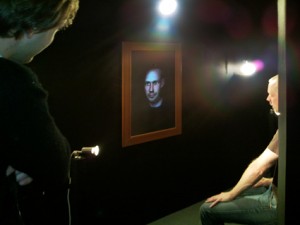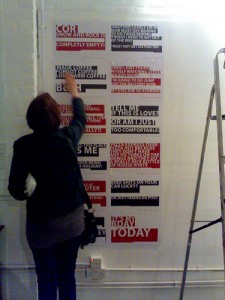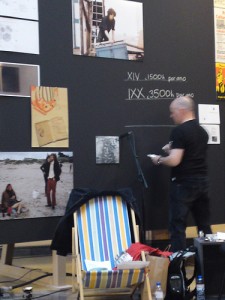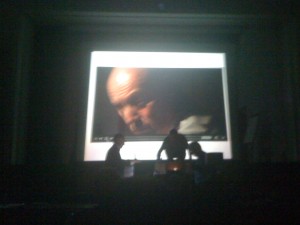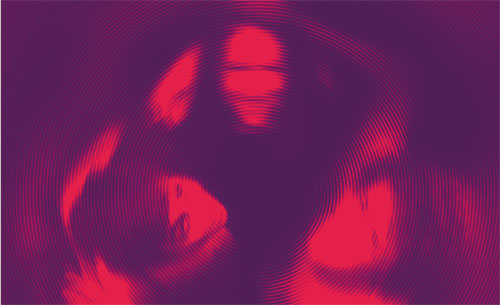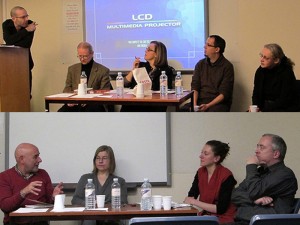News
Listen With Ballard: Ballardian Architecture Online
Tagged as Architecture, Ballard, Urban
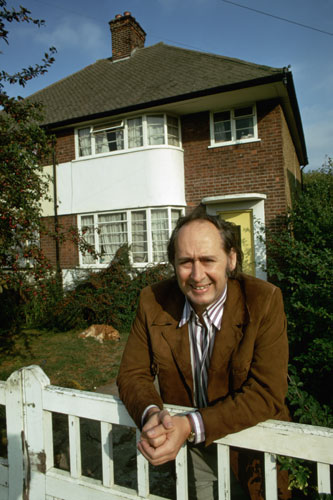
You can now listen to the talks at the Royal Academy Ballardian Architecture symposium last month, including those of IMCC Deputy Director David Cunningham, John Gray, Nigel Coates and Nic Clear.
Audio files are up on the RA site here.
Alter Ego Reloaded
Tagged as alexa wright, art, body
Alexa Wright is currently showing a new configuration of the Alter Ego installation in Locate Me, an exhibition that examines the impact of new communication technologies on traditional concepts of space at Kunstraum Kreuzberg, Bethanien, Berlin, 22 May – 8 August, 2010. More details here.
Thomson & Craighead do London
Tagged as art, London, thomson, time
As part of the re-launch of the Museum of London, Thomson and Craighead are making a new work for the entrance hall. The new displays open from May 28th, and they will be building the commission over the space of a week ending June 6th, so come along and see it there. Works by The Singh Twins and Keith Coventry will also be on display, and the exhibition runs until September 5th. More info here.
Thomson and Craighead are further showing two brand new works, ‘The End’ and ‘The Time Machine in alphabetical order’, in a solo exhibition at Highland institute of Contemporary Art, running from June 20th to July 25th. Finally, you can also hear the duo being interviewed on Resonance FM here.
Scratch Orchestra Dealer Concert Report
Tagged as archive, art, music, the avant-garde
Stefan’s report on the most excellent Scratch Orchestra event at the Culturgest, Porto, as part of their Cornelius Cardew: The Freedom of Listening exhibition, is now available here and also below the break.

Last Friday 14th May saw the launch of the Architectural Association’s City Cultures project, to which the IMCC’s David Cunningham has been a contributor. The texts from the project, including David’s ‘Nine Theses on the Metropolis’, can be read or downloaded here.
The AA have also posted a video recording of the launch event on their website, with brief talks from David, Doug Spencer, Peter Carl, and others, at: http://www.aaschool.ac.uk/VIDEO/lecture.php?ID=1230
For those interested, an earlier talk on Metropolitics by David at the AA, as part of their Landscape Urbanism Public Lectures series, is also up on their website. Watch it here.

Chris Daley and Jo Wargen have set up a useful new wordpress site for the Wednesday lunchtime English Literature Research Seminars run by the Department of English, Linguistics and Cultural Studies at Westminster. The address is: http://seminarserieswmin.wordpress.com/
Check next semester for details of upcoming seminars.
Revisiting the Scratch Orchestra
Tagged as music, politics, Scratch Orchestra, the avant-garde
The IMCC’s resident activist artist, and ex-member of the Scratch Orchestra, Stefan Szczelkun, will be taking part in a performance, with Keith Rowe and Carole Finer, as part of Cornelius Cardew and the Freedom of Listening, curated by Dean Inkster, at the Culturgest, Porto on Saturday 15th May. Later on the same evening Stefan will also be in conversation and showing a selection of excerpts from his Active Archives video project.
The Porto exhibition traces the career of the English avant-garde composer Cornelius Cardew, and includes scores and vast archival material of the experimental performances developed by Cardew and the members of the Scratch Orchestra, which he co-founded in 1969, along with posters from the period following Cardew’s decision in the mid-1970s to renounce his work as an avant-garde composer and devote his energy to politics.

Just gone out on the e-flux mailing list, so we thought we might as well post it here also (read on after the break):
Announcing ambitious MA courses and PhD programme in the Arts, Humanities, and Cultural Institutions at the Institute for Modern and Contemporary Culture (IMCC), School of Social Sciences, Humanities and Languages, University of Westminster, London.
A new website documenting the IMCC’s Archiving Cultures series of events and projects is now up at: http://archivingcultures.co.uk/
The website includes programmes, paper abstracts and artworks relating to the Hole in Time, Old Media / New Work and Vernacular Photographic Archives projects taking place at Westminster, in collaboration, respectively, with the Sussex Centre for German-Jewish Studies, the Magic Lantern Society and Photographer’s Gallery.
Archiving Cultures is organised by the IMCC’s Sas Mays and follows on from the 2008-09 research project, funded by the AHRC Beyond Text award, entitled ‘Spiritualism and Technology in Historical and Contemporary Contexts’.

Activating Brixton Art Gallery, 1983-86: Archives and Memories
Saturday 5th June 2010, 11am-4pm
Westminster Forum, University of Westminster, 32 Wells street, London W1T 3UW
A collaboration between BACA (Brixton Artists Collective Archives) group, and the 198 Contemporary Arts and Learning, the project 50 Reasons to Celebrate, Brixton Art Gallery – 1983-86, Archiving Brixton Art Gallery & Artists Collective (2010-2012) will be officially launched in Autumn 2010. BACA consists of five individual and original members of the Brixton Artists Collective: Teri Bullen, Guy Burch, Françoise Dupré, Rita Keegan, and the IMCC’s Stefan Szczelkun. They were part of a significant group of artists, the Brixton Artists Collective, and were instrumental in the foundation, development and running of the Brixton Art Gallery.
The ‘Activating Brixton Art Gallery, 1983-86: Archives and Memories’ symposium at Westminster is the first of two university-based symposia that will contribute to the Project’s research and development in relation to content, context, process and dissemination. An invited group will discuss the Brixton Art Gallery & Artists Collective’s socio-political and artistic concerns and contemporary relevance.
Speakers include: Paul Dash, Department of Educational Studies, Goldsmiths; Adrian Glew, Tate Archive; Althea Greenan, curator Women’s Art Library, Goldsmiths; Ajamu, artist; Sally Mould, Brixton Art Gallery exhibiting artist and Copyart.
The 50 Reasons to Celebrate, Brixton Art Gallery – 1983-86 project promotes and celebrates the achievement and legacy of the Brixton Art Gallery & Artists Collective and provides contexts and opportunities for the re-opening of existing archives and for future archiving of the Gallery and its Collective. The project incorporates public events and participation including a postcard project, an oral history project, a community archiving project, community-based workshops, gallery talks, symposia, a publication and a major archiving exhibition at the 198 Contemporary Arts and Learning (winter 2011). At the end of the Project, Brixton Art Gallery & Artists Collective’s old and new archives will be transferred and donated to Tate Archive for safekeeping and for broader public access (Spring 2012). Lambeth Archives, Tate Archive, Young People’s Programmes, Tate Britain and the Women’s Art Library, Goldsmiths, University of London have confirmed their support. Artist Studio Company, Autograph ABP, Birmingham City University, London School of Economics, Hall Carpenter Archive and the University of Westminster are also confirmed partners.
For further details about the syposium, please contact Stefan Szczelkun at: S.Szczelkun@westminster.ac.uk
For more information about the Brixton Art Gallery and its Collective and first 50 exhibitions please visit the website set up and developed by Brixton Art Gallery & Artists Collective co-founder Andrew Hurman: http://brixton50.co.uk
Ballardian Architecture
Tagged as Architecture, Ballard, technology, Urban

David Cunningham, Deputy Director of the IMCC, is, along with John Gray and Nic Clear, one of the participants in the symposium Ballardian Architecture: Inner and Outer Space to be held at the Royal Academy of Arts on Saturday 15th May, 2-5pm. The event will trace several themes in Ballard’s literary analysis of the contemporary built environment, including the concept of spectacle and role of the media in contemporary society, and how Ballard’s fascination with so-called “invisible literatures”, such as scientific journals, technical manuals and advertising copy, can be seen as a literary counterpart to pop art and the “brutalist” aesthetic of modernity.
Tickets: £25/£16 reductions* (includes a drink)
Further details here.
Route have posted a video up on their YouTube channel of the launch, back in December, for Michael Nath’s superb debut novel La Rochelle at Westminster. Watch it here. There’s also an interview with Michael on the Route website here.
There have already been excellent reviews for La Rochelle – described by Michael Wood as stylish, very funny, discreetly surprising’ – in both The Independent and the Big Issue. Buy the novel at: www.route-online.com
Due to illness Nick Hubble has unfortunately had to cancel his seminar on ‘Naomi Mitchison: From Intermodernism to Science Fiction’ that was scheduled to take place at Westminster this Wednesday 14th at 1.15pm.
Apologies, and we will of course re-schedule Nick’s paper for a future date some time soon.
Archigram Archival Project
Tagged as Archigram, Architecture, the avant-garde, Urban

Congratulations to our colleagues in Architecture. The magnificent Archigram Archival Project, some four years in the making, launches at Westminster’s Regent Street building on April 19th. Days of online browsing lie ahead.
Once it’s up and running on the 19th, the website will be here: http://archigram.westminster.ac.uk/
Journal of Visual Culture: The Obama Issue: FREE content
Tagged as media, politics, visual culture
FREE content: Entire Obama Issue of ‘Journal of Visual Culture’, including contributions by Dora Apel, Lauren Berlant, Lisa Cartwright, Anna Everett, Raimi Gbadamosi, Curtis Marez, Nicholas Mirzoeff, W.J.T. Mitchell, Shawn Michelle Smith, Gayatri Spivak, Julian Stallabrass, Marita Sturken, and many, many more.
To access go to:
http://vcu.sagepub.com/current.dtl
Click on link by each article marked ‘PDF’.
Download, read, enjoy, circulate.
From Intermodernism to Science Fiction
Tagged as feminism, Modernism, science fiction

Wednesday 14th April, 1.15-2.30pm
Room 106, University of Westminster, 32-38 Wells Street, W1T 3UW
Nick Hubble (Brunel University)
‘Naomi Mitchison: From Intermodernism to Science Fiction (via Mass-Observation)’
From her 1920s novels, influenced by Lawrence but aimed at the audience of Wells, to her subsequent deployment of modernist techniques for political ends, Naomi Mitchison may be considered a key intermodern writer. Her literary output during the 1930s – The Corn King and the Spring Queen (1931), Beyond This Limit (1934; a feminist fantasy illustrated by Wyndham Lewis), We Have Been Warned (1935), The Moral Basis of Politics (1938) and The Blood of the Martyrs (1939) – is comparable with Orwell’s. Her relentless pursuit of the ‘just society’, free from gender-based and sexual repression, made her a controversial figure even in that controversial decade. And her close literary associates of that decade – including Auden, Aldous Huxley, Olaf Stapledon, Stevie Smith, Wyndham Lewis and Walter Greenwood – suggest different ways of thinking about literary networks and cultural history in general. She was also a friend and supporter of Tom Harrisson and Mass-Observation, for whom she kept a wartime diary. Nick Hubble’s paper analyses this intermodern work and investigates how it relates to Memoirs of a Spacewoman (1962), a forerunner of the 1970s feminist utopian science fiction of writers such as Ursula Le Guin, Marge Piercy and Joanna Russ.
Free to all.

To book email info@instituteformodern.co.uk or download the booking form
Date: Thursday 27th May 2010 – Saturday 29th May 2010
Venue: The Old Cinema, University of Westminster, 309 Regent Street, London
Cost: £50/25 concessions, booking essential
Thursday 27th May 2010
12:00 Registration
1:00-2:15 Session 1
W.J.T. Mitchell (English and Art History, University of Chicago)
2:15-4:15 Session 2 Roundtable: Education
Mark Dunhill (School of Art, Central Saint Martins College)
William Cobbing (Wimbledon College of Art)
Joanne Morra (School of Art, Central Saint Martins College)
Adrian Rifkin (Art Writing, Goldsmiths, University of London)
Joy Sleeman (History and Theory of Art, Slade School of Fine Art)
Victoria Walsh (Education and Interpretation, Tate Britain)
4:45-6:30 Session 3
Gary Hall (Media and Performing Arts, Coventry University)
Joanna Zylinska (Media and Communications, Goldsmiths, University of London)
6:30-8:30: Reception
Friday 28th May 2010
10:00-11:15 Session 4
Keith Moxey (Art History and Archaeology, Columbia)
11:15-1:00 Session 5
Divya P. Tolia-Kelly (Geography, Durham University)
David Cunningham (Cultural & Critical Studies, University of Westminster);
1:00-2:00 Lunch (Not provided)
2:00-4:00 Session 6 Roundtable: Design Studies – Visual Studies – Cultural Studies
Glen Adamson (Design/Craft, RCA/V&A)
Sarah Chaplin (Architectural Humanities, Greenwich University)
Elizabeth Guffey (Design, SUNY, Purchase)
Raiford Guins (Digital Cultural Studies, SUNY, Stony Brook)
Guy Julier (Design, Leeds Metropolitan University)
Penny Sparke (Design History, Kingston University)
4:30-5:45 Session 7
Lisa Cartwright (Communication, UC, San Diego)
Saturday 29th May 2010
10:30-11:45 Session 8
Nicholas Mirzoeff (Media, Culture, and Communication, New York University)
11:45-1:30 Session 9
Esther Leslie (Political Aesthetics, Birkbeck, University of London)
Esther Gabara (Romance Studies, and Art, Art History, & Visual Studies, Duke University)
1:30-2:30 Lunch (Not provided)
2:30-4:30 Session 10 Roundtable: The Future Institution: An International Association for Visual Culture Studies?
Michael Ann Holly (The Clark Art Institute, Williamstown)
Jeremy Gilbert (University of East London)
Stephen Melville (Art/Aesthetics/Philosophy, Ohio State University)
Griselda Pollock (Art Histories/Cultural Studies, University of Leeds)
Marquard Smith (Visual Culture Studies, University of Westminster)
4:30 Conference Ends
Organizers: Nicholas Mirzoeff (New York University), Joanne Morra (University of the Arts London), Marquard Smith (University of Westminster, London)
Iain Sinclair talk
Tagged as Literature, London, Sinclair, Urban
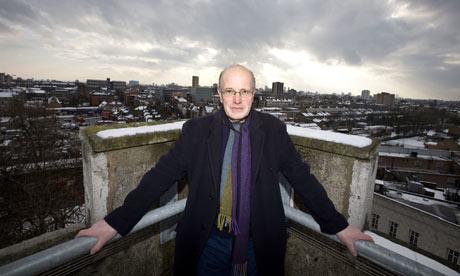
Thursday 4th March, 6pm
The Boardroom, University of Westminster, 309 Regent Street, W1B 2UW
In the first of a new series of talks at Westminster entitled 21st Century London, exploring the challenges and opportunities the city offers to the contemporary writer, Iain Sinclair will be in conversation with David Cunningham, Deputy Director of the IMCC. Future speakers will be Toby Litt (March 11), Diran Adebayo (March 18) and visiting research fellow at the Institute Rachel Lichtenstein (April 22).
For more information, please email Monica Germana at m.germana@westminster.ac.uk. Events are free of charge, but booking is essential: please email Sharon Sinclair at sinclas@wmin.ac.uk to book a place.
THE 2010 VISUAL CULTURE STUDIES CONFERENCE
Tagged as art, visual culture
THE 2010 VISUAL CULTURE STUDIES CONFERENCE
To book email info@instituteformodern.co.uk or download the booking form here
Thursday 27 May – Saturday 29 May, 2010
Venue: The Old Cinema, 309 Regent Street, University of Westminster, London
£50/25 concessions, booking essential
Confirmed contributors: Glen Adamson (RCA/V&A); Lisa Cartwright (UC, San Diego); Sarah Chaplin (Greenwich); Will Cobbing (Wimbledon College of Art); David Cunningham (Westminster); Mark Dunhill (Central Saint Martins); Esther Gabara (Duke); Elizabeth Guffey (SUNY, Purchase); Raiford Guins (SUNY, Stony Brook); ); Gary Hall (Coventry); Michael Ann Holly (The Clark Institute); Guy Julier (Leeds Met); Esther Leslie (Birkbeck); Stephen Melville (Ohio State); Nicholas Mirzoeff (NYU); W.J.T. Mitchell (Chicago); Joanne Morra (Central Saint Martins); Keith Moxey (Columbia); Laura Mulvey (Birkbeck); Griselda Pollock (Leeds); Adrian Rifkin (Goldsmiths); Joy Sleeman (Slade); Marquard Smith (Westminster); Penny Spark (Kingston); Marita Sturken (NYU); Divya P. Tolia-Kelly (Durham); Victoria Walsh (Tate Britain); Joanna Zylinska (Goldsmiths)
Visual Culture Studies in Europe: An Update
Tagged as education, Europe, visual culture
Friday’s international conference entitled ‘Visual Culture Studies in Europe’, hosted by the Institute, was a huge success. A stella cast of leading academics, curators, and editors from Austria, Spain, Croatia, Norway, Belarus, Italy, England, and France including Iain Chambers, Oliver Grau, and Adrian Rifkin came together to discuss the study of visual culture within the context of European universities, art colleagues, and cultural institutions. The audience, a talkative mix of staff and students from Westminster as well as welcome guests from elsewhere in London, Brighton, and as far away as Lithuania, had a day to remember. The conference speakers, members of the Visual Culture Studies in Europe Network, plan to meet again next year, this time in Barca!


The Institute for Modern and Contemporary Culture
University of Westminster Department of English, Linguistics and Cultural Studies
32-38 Wells Street, London W1T 3UW. United Kingdom.

